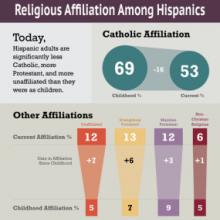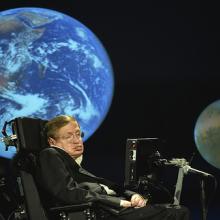stephen hawking
“What could define God [is thinking of God] as the embodiment of the laws of nature. However, this is not what most people would think of that God,” Hawking told Diane Sawyer in 2010. “They made a human-like being with whom one can have a personal relationship. When you look at the vast size of the universe and how insignificant an accidental human life is in it, that seems most impossible.”
The new Stephen Hawking biopic The Theory of Everything, presents the relationship between the famed physicist and his first wife, Jane, in beautiful display. Screenwriter Anthony McCarten described the underlying theme of the film such:
“If all of us were some kind of cosmic accident, what chance love? That’s the point at which science breaks down, and something else exists.”
That rift between the proofs and facts that drive Hawking (played by Eddie Redmayne) and the “something else” represented by the inspiring story at its center is one that reflects a larger conversation about faith, science, and the unknown that feels like it’s been a part of culture from the beginning of time (all puns aside). It’s unfortunate, then, that the film doesn’t take the opportunity to explore those discussions beyond the surface level.
The number of Hispanic-Americans who say they adhere to no religion is growing and now rivals the number of Hispanic evangelicals, a new study has found.
The share of Hispanics living in the U.S. who say they are atheist, agnostic, or have no religious affiliation has reached 12 percent, according to the 2013 Hispanic Values Survey conducted by the Public Religion Research Institute. That is double the rate reported in 1990 by the American Religious Identification Survey.
Researchers say Hispanic “nones” are now statistically equal to the number of U.S. Hispanic evangelical Protestants — 13 percent — and warn of a religious divide in the Hispanic community that will be felt for decades to come.
Renowned scientist and author of such books as A Brief History of Time, Stephen Hawking suggested recently that it is conceivable in the future that we may be able to upload the contents of the human brain onto a computer so that the information may, in a sense, become immortalized. He readily conceded, however, that such a task was well beyond our current technological capacity, and he offered some measured words of caution for those who sought to read too much into this potential.
When asked if this meant that there was potential for the mind to live forever through an alternative medium, he was dismissive. Such talk of human immortality, he said (and in particular, the very notion of heaven), was the stuff of fairy tales for people “afraid of the dark.”
Then in the same week, TIME Magazine featured a story about Google on its cover, highlighting a new company it has recently launched called Calico. The new enterprise is perhaps the most ambitious of what Google commonly calls their “moonshot” projects, as its aim is to prolong the human lifespan potential, and perhaps eventually solve the “problem” of death.
All of this was particularly interesting to me in the context of the conversation between Richard Dawkins and Jon Stewart on a recent episode of The Daily Show about whether science or religion was more responsible for hastening humanities apparent self-destruction.



